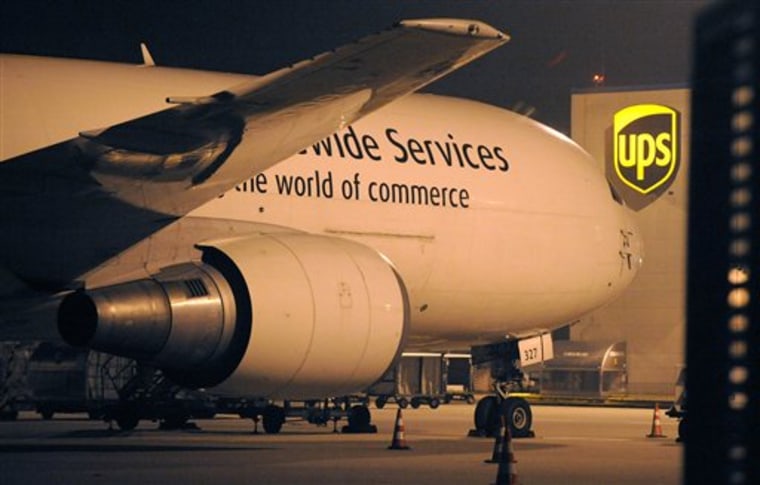The plotters behind last week's unsuccessful mail bombings could not have known exactly where their Chicago-bound packages were when they were set to explode, even after a suspected test run, U.S. officials say.
The communication cards had been removed from the cell phones attached to the bombs, meaning the phones could not receive calls, officials said, making it likely the terrorists intended the alarm or timer functions to detonate the bombs.
"The cell phone probably would have been triggered by the alarm functions and it would have exploded midair," said a U.S. official briefed on the investigation of the bombs taken off cargo planes Friday in England and the United Arab Emirates. This person, like other officials in this story, spoke on condition of anonymity to discuss the case.
Government officials told NBC News there's no plan to further restrict passenger use of electronic devices onboard planes. Some tech blogs reported Tuesday that the government was considering banning WiFi service from planes, but these officials say no such measure is under consideration.
The official also said Tuesday that each bomb was attached to a syringe containing lead azide, a chemical initiator that would have detonated PETN explosives packed into each computer printer toner cartridge. Both PETN and a syringe were used in the failed Christmas Day bombing of a Detroit-bound airliner linked to an al-Qaida branch in Yemen. A law enforcement official told NBC News on Wednesday that it wasn't clear how the liquid was to be forced out of the syringes to ignite an explosion.
The Department of Homeland Security hopes to impose new requirements by Friday for air cargo shipments into the U.S. A senior official told NBC they'll likely include stricter screening for packages from higher threat areas and longer notice time from shippers to the U.S. government, indicating where packages are coming from before individual flights arrive. Officials are also considering additional screening of carry-on baggage for passengers flying into the U.S., but no final decision has been reached on how that would work.
Homeland Security Secretary Janet Napolitano talked on Wednesday with executives from UPS, FedEx, DHL, and other shippers to tell them of the need to strengthen screening and provide better training for cargo handlers. A Homeland official says the industry expressed a willingness to make the necessary changes. And the man in charge of the TSA, John Pistole, made a surprise visit to Yemen on Wednesday to look at cargo screening there.
The challenges of finding bombs like the two shipped last week from Yemen is a big one, given that both packages passed undetected through the screening measures currently in use overseas. An FBI bulletin sent to local law enforcement in the U.S. says the "FBI remains concerned about explosive devices built with both metallic and non-metallic components, some of which may require advanced screening procedures to detect."
President Barack Obama stressed the need for stronger security for air cargo in a telephone conversation Tuesday with Ali Abdullah Saleh, Yemen's president, the White House said.
Investigators believe al-Qaida mailed three innocent-looking packages from Yemen to Chicago in mid-September to watch the route they took.
One of those packages contained a copy of British author George Eliot's 1860 novel "The Mill on the Floss." Authorities were investigating whether it was a subtle calling card from Anwar al-Awlaki, the U.S.-born Yemeni cleric who has inspired a string of attempted attacks against the West.
A federal official told NBC the packages were addressed to real destinations — bookstores and Islamic centers in Chicago that are accustomed to receiving unsolicited materials for possible sale. The packages were opened in the U.S. before delivery, determined to be harmless, and allowed to continue to their destinations.
By contrast, the two boxes containing the cargo bombs were addressed, according to an FBI bulletin to law enforcement, to two locations "previously associated with synagogues; however FBI has confirmed that no synagogues are currently at those locations." Both were addressed to names of historic figures from the Crusades and the Spanish Inquisition.
Al-Awlaki is now a fugitive, targeted by a U.S. kill or capture list. Yemeni authorities put him on trial in absentia Tuesday, charging him as a new defendant in the October killing of a French security guard.
Al-Awlaki became well versed in English literature while in prison in Yemen from 2006 to 2007 and later posted online book reviews slamming Shakespeare and praising Charles Dickens. Beyond that, however, there was no immediate connection between al-Awlaki and the book found in the package mailed in September, one U.S. official said.
Shipping carriers allow Internet users to monitor packages from point to point through the international cargo system.
While a test run would have given al-Qaida a sense of the shipping routes, there was no guarantee the route would be the same a month — or even a day — later, officials at UPS and FedEx said Tuesday. Routes change based on the weather, cargo volume and plane schedules, they said.
Neither company lets customers see precisely which planes their packages are on. Sometimes they are packed on cargo planes, sometimes on passenger planes. There is no way for customers to track their packages in real time while in flight, officials with both companies said.
Still, knowing the time shipments were logged in leaving Europe and the time they were scanned arriving in Chicago would have given al-Qaida operatives a large enough time window to allow them to have rigged their bombs to blow up somewhere along the way.
___
NBC News' Pete Williams and the Associated Press contributed to this report.
